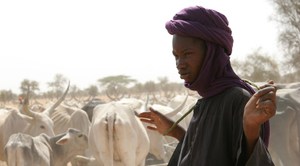Unemployment for youth is a growing concern in Africa. Youth account for 60 per cent of all unemployed, according to the World Bank.
6 April, Rome – Rural youth recently reported that access to information, lack of credit and negative perceptions around farming are the leading reasons why African young people are leaving small farming at such alarming rates.
The comments came during the 2016 Youth Agribusiness, Leadership, and Entrepreneurship Summit on Innovation (YALESI 2016), held in Dakar, Senegal from 29 to 31 in March.
The conference – which gives young African men and women living in rural areas the opportunity to discuss key issues and learn new skills – is an initiative that came out of the IFAD-supported Global Youth Innovation Network.
During the conference, which was co-organized by IFAD alongside the Government of Senegal and GYIN, IFAD hosted a number of sessions on agribusiness and entrepreneurship practices, as well as shared agribusiness and entrepreneurial know-how for over 250 African youth.
"High youth unemployment is one of the biggest problems currently affecting African youth," said Moses Abukari, IFAD's Country Programme Manager and Youth Focal Point for West and Central Africa.
"When youth can't find viable jobs in their communities, they begin to migrate from rural areas in search of opportunities in bigger cities or different countries where they face an uncertain future," he continued.
According to Abukari, when young people can participate in community decision-making and take management roles in local organizations, they improve their situations while also contributing their energy and creativity to their communities.
"Young people have many innovative ideas but are often excluded from planning and policy processes relating to the future of rural areas," said Abukari.
"This conference is unique because it gives young women and men, from both rural and urban areas, the tools and skills they need to make lasting changes within their communities," he continued.
"It serves as a platform for youth to speak about problems that directly impact their lives, but also for them to share their solutions and successes."
